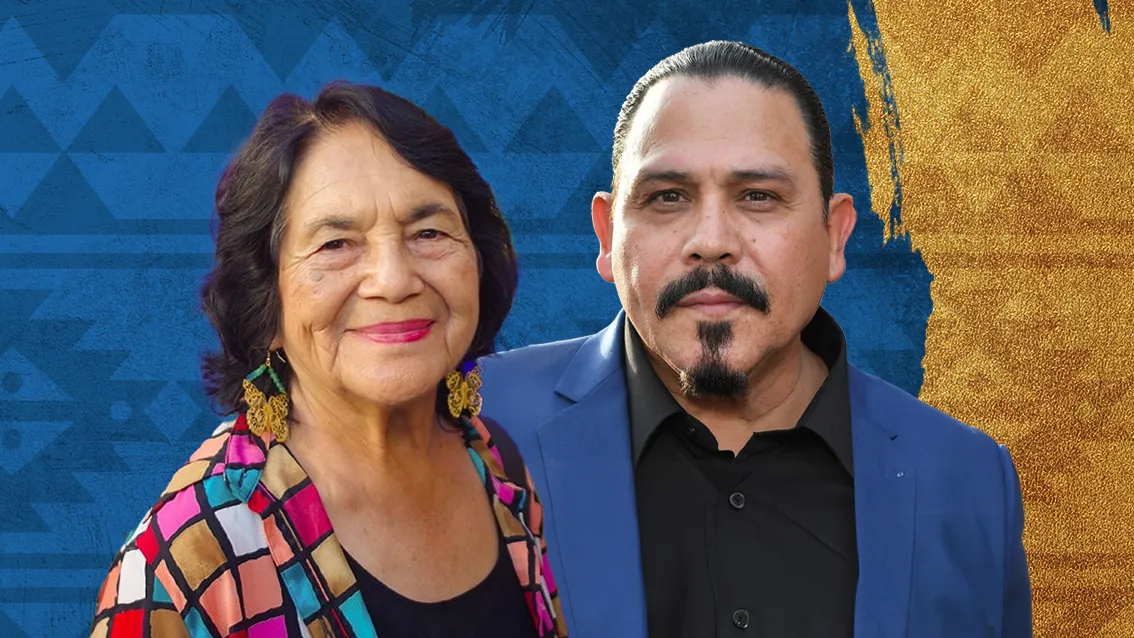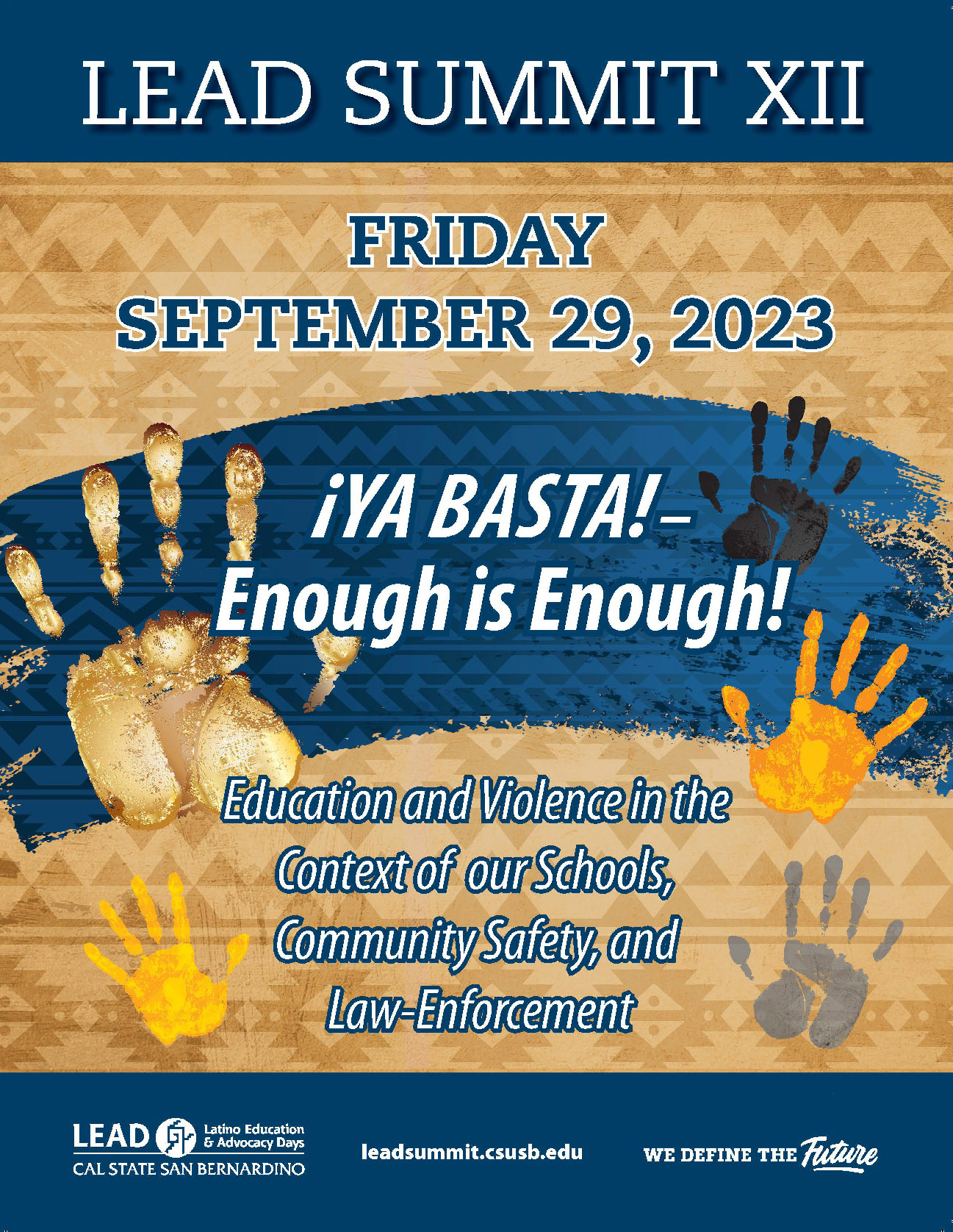Alan Llavore | Office of Strategic Communication | (909) 537-5007 | allavore@csusb.edu

Activist Dolores Huerta has been named the honorary chair/madrina de honor and actor Emilio Rivera will be the honorary chair/padrino de honor for the Latino Education & Advocacy Days LEAD Summit XII, Sept. 29 at Cal State San Bernardino.
And both are familiar with the summit’s theme, “¡Ya Basta! – Enough is Enough!: Education and Violence in the Context of our Schools, Community Safety, and Law-Enforcement,” having experienced different strands of it, said Enrique Murillo Jr., executive director of LEAD and CSUSB professor of education.
“In September 1988, in front of the St. Francis Hotel in Union Square, Huerta was severely beaten by San Francisco Police officer Frank Achim during a peaceful and lawful protest of the policies/platform of then-candidate for president, George H. W. Bush,” Murillo said. “The baton-beating caused significant internal injuries to her torso, resulting in several broken ribs and requiring the removal of her spleen in emergency surgery. The beating was caught on videotape and broadcast widely on local television news. Later, Huerta won a large judgment against the SFPD and the city of San Francisco for the attack, the proceeds of which she used for the benefit of farm workers. As a result of this assault and the suit, the SFPD was pressured to change its crowd control policies and its process of officer discipline.”
Huerta is one of the most influential Chicana/Latinas of the 20th century, known for her work as a community organizer, labor activist, civil rights leader and advocate for social, economic and environmental justice. She is the founder and president of the Dolores Huerta Foundation, and co-founded the United Farm Workers of America with the late Cesar Chavez.
She has worked for labor rights and social justice for almost 60 years. In 1962, she and Chavez founded the United Farm Workers union. She served as vice president and played a critical role in many of the union’s accomplishments for four decades.
In 2002, she received the Puffin/Nation $100,000 prize for Creative Citizenship, which she used to establish the Dolores Huerta Foundation (DHF). The foundation is connecting groundbreaking community-based organizing to state and national movements to register and educate voters; advocate for education reform; bring about infrastructure improvements in low-income communities; advocate for greater equality for the LGBT community; and create strong leadership development.
Huerta has received numerous awards, including The Eleanor Roosevelt Humans Rights Award from President Bill Clinton in 1998. And in 2012 President Barack Obama bestowed Huerta with The Presidential Medal of Freedom, the highest civilian honor in the United States.
Rivera’s experience goes beyond his portrayals on the big and small screen. “Emilio grew up in a Frogtown, an impoverished neighborhood of Los Angeles, Elysian Valley, from a gang family,” Murillo said. “With nearly 150 acting credits to his name, he is known for his authenticity and presence on screen, especially while depicting criminals and law enforcement officers.”
In his role as Marcus Álvarez in the television series, “Mayans M.C.,” Emilio Rivera is often referred to as “El Padrino,” a term of immense respect. In real life, he bears the title of padrino as the summit’s honorary chair.
Rivera was born in San Antonio, Texas, and grew up in Los Angeles. After graduating from high school, he joined the U.S. Army, but later became associated with street gangs, took drugs and drank.
But for his love of acting, Rivera may have continued down that path. Acting, with its training and discipline, he said, saved his life. His credentials places him among the top Latino actors.
While he may be most visible as Marcus Álvarez in “Mayans M.C.,” and its predecessor, “Sons of Anarchy,” he also has a prominent role in Eva Longoria’s feature film, “Flamin’ Hot,” as well as “High Crimes” (with Ashley Judd and Morgan Freeman) and “Confessions of a Dangerous Mind” (with George Clooney and Julia Roberts).
Each year the summit, which is open to the public and free to attend, brings together teaching professionals and educators, researchers, academics, scholars, administrators, independent writers and artists, policy and program specialists, students, parents, civic leaders, activists and advocates – all sharing a common interest and commitment to education issues that impact Latinos to help them define the future.
Programs during the summit will examine the challenges the community faces. Scheduled panel discussions will include “Historical, Cultural and Racial Responsiveness and Revitalization: Building Dignity and Social Justice from the Massacre at El Porvenir to Uvalde”; “Missing and Murdered Indigenous People”; “Gun Violence Prevention: Students Need Safe Environments to Learn, Live, and Grow”; “Federal Response & Interagency Working Group: Resources and Preparedness”; and “Police Use of Excessive Force/Raza Database Project.”
In addition, the summit’s featured photo exhibit, “Resilience in Inland Southern California: Enduring Policing, Violence, and Poverty,” by Humberto Flores, will present a human perspective on the issue. Flores, a first-generation Chicano from the Inland Empire, is a doctoral candidate in sociology from UC Santa Barbara whose research examines the brunt of policing in the Inland Empire. He was a featured speaker for the university’s Conversations on Race and Policing during the 2023 spring semester.
Registration is now open for the summit, which will take place from 8 a.m.-3 p.m. Sept. 29 at the Santos Manuel Student Union South. Visit the 2023 LEAD Summit XII Registration webpage to reserve your spot; attending the summit is free.
Visit the LEAD Summit XII website for more information on the summit and LEAD’s other programs.
